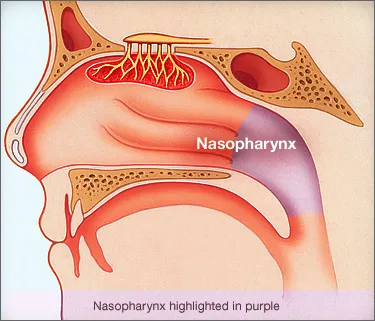
Nasopharyngeal cancer is also called nasopharyngeal carcinoma (NPC).
Causes of Nasopharyngeal Cancer
Scientists are not sure what exactly causes nasopharyngeal cancer. However, the cancer has been strongly linked to the Epstein-Barr virus (EBV).
Although EBV infection is common, not everyone who has EBV will get nasopharyngeal cancer. In the U.S., most people who have had an EBV infection never have long-term problems. That’s because the body’s immune system destroys the virus.
But sometimes, genetic material (DNA) from the virus mixes with the DNA in the cells of the nasopharynx. The change in DNA causes cells to grow and divide abnormally, causing cancer. This is rare.
The risk for NPC goes up if you eat a diet rich in salt-cured fish and meat. Tobacco and alcohol also increase the risk. Some scientists believe that chemicals in these things further damage the DNA in cells.
Who Gets Nasopharyngeal Cancer?
Fewer than one in every 100,000 people in North America gets this type of cancer, according to the American Cancer Society.
The cancer is most common in southeast China. It is also much more common in:
- Other parts of Asia
- North Africa
- Inuit populations of Alaska and Canada
- Chinese and Hmong immigrant groups in the U.S.
In the U.S., nasopharyngeal cancer has also been seen in African-Americans, Hispanics, and white people.
You are more likely to get this type of cancer if you:
- Are male
- Under age 55
- Eat a diet rich in salt-cured fish and meats
- Have a family history of nasopharyngeal cancer
- Have certain genes linked to cancer development
- Have come in contact with EBV
Some, but not all, studies have found a higher risk of nasopharyngeal cancer in people who:
- Smoke
- Drink a lot of alcohol
- Work around wood dust or a chemical called formaldehyde
Nasopharyngeal Cancer Symptoms
Symptoms of nasopharyngeal cancer may include:
- Blurry or double vision
- Difficulty speaking, including hoarseness
- Ear infections that keep coming back
- Face pain or numbness
- Headache
- Hearing loss, ringing in the ears, or a feeling of fullness in the ear
- Lump in neck or nose
- Nosebleeds
- Stuffy nose
- Sore throat
Keep in mind, such symptoms are more likely to occur with many other diseases and health conditions that are far less serious than nasopharyngeal cancer.
Nasopharyngeal Cancer Treatment
If you are diagnosed with nasopharyngeal cancer, you will need regular follow-ups with your medical team before, during, and after treatment.
Your treatment will depend on many things, including:
- Location of the tumor
- Stage of the tumor
- Your overall health
Treatment may include:
Radiation Therapy . Radiation therapy uses X-rays to kill cancer cells and stop them from growing. It is usually part of the standard treatment for early stage nasopharyngeal cancer.
One type called IMRT delivers high-dose radiation directly to the tumor while minimizing damage to nearby healthy tissue. It may cause fewer side effects or complications than conventional radiation treatment to the nasopharynx, which can lead to:
- dry mouth
- inflammation of the lining of your mouth and throat
- blindness
- brain stem injury
- death of healthy tissue
Surgery. Surgery can sometimes cure nasopharyngeal cancer if all of the tumor and cancer cells are removed. But the surgery can be difficult because of the tumor’s location near the skull. It may cause permanent damage to the eye and other nearby structures.
Not all people with nasopharyngeal cancer can have surgery. Your doctor will consider the location and stage of your tumor when discussing your treatment options.
Biologic drugs. Biologic drugs affect how your body’s immune system fights disease. They are also called monoclonal antibodies.
A biologic drug called bevacizumab (Avastin), blocks production of a substance called vascular endothelial growth factor (VEGF) . Sorafenib (Nexavar), and pazopanib (Votrient) are drugs that also block this protein. Studies show that patients with nasopharyngeal cancer who have lower levels of VEGF are more likely to remain disease-free after treatment. Bevacizumab is currently being evaluated to see if it will help improve your overall survival when combined with other treatments, such as chemotherapy. Other biologic drugs are also used. This includes the drug cetuximab (Erbitux), which targets a protein on the cancer cell’s surface. Other drugs that target this protein, including nimotuzumab and icotinib, have shown promising results in clinical trials.
Chemotherapy . Chemotherapy uses drugs to kill cancer cells. By itself, it is not usually helpful for treating nasopharyngeal cancer. But it may help you live longer when combined with radiotherapy or biological drugs.

Post a comment